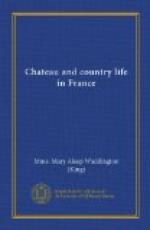The Paris election by an overwhelming majority was his great triumph. The Government did all they could to prevent it, but nothing could stop the wave of popularity. The night of the election Boulanger and his Etat-major were assembled at Durand’s, the well-known cafe on the corner of the Boulevard and the rue Royale. As the evening went on and the returns came in—far exceeding anything they had hoped for—there was but one thought in every one’s mind—“A l’Elysee.” Hundreds of people were waiting outside and he would have been carried in triumph to the Palace. He could not make up his mind. At midnight he still wavered. His great friend, the poet Deroulede, then took out his watch—waited, in perfect silence, until it was five minutes past twelve, and then said, “General, depuis cinq minutes votre aureole baisse.” Boulanger went out by a side door, leaving his friends—disappointed and furious—to announce to the waiting crowd that the General had gone home. He could certainly have got to the Elysee that night. How long he would have stayed, and whom he would have put there, we shall never know.
MAREUIL, October 31st.
It has been a beautiful, warm, bright autumn day and, for a wonder, we have had no frost yet, not even a white one, so that the garden is still full of flowers, and all day the village children have been coming—begging for some to decorate the graves for to-morrow. I went in to the churchyard this afternoon, which was filled with women and children—looking after their dead. It is not very pretty—our little churchyard—part of a field enclosed on the slope of the hill, not many trees, a few tall poplars and a laurel hedge—but there is a fine open view over the great fields and woods—always the dark blue line of the forest in the distance. They are mostly humble graves—small farmers and peasants—but I fancy they must sleep very peacefully in the fields they have worked in all their lives—full of poppies and cornflowers in summer and a soft gold brown in the autumn, when the last crops are cut and the hares run wild over the hills.
I think these two days—the “Toussaint” and the “Jour des Morts”—are the two I like best in the Catholic Church, and certainly they are the only ones, in our part of the world, when the churches are full. I walked about some little time looking at all the preparations. Every grave had some flowers (sometimes only a faded bunch of the last field flowers) except one, where there




